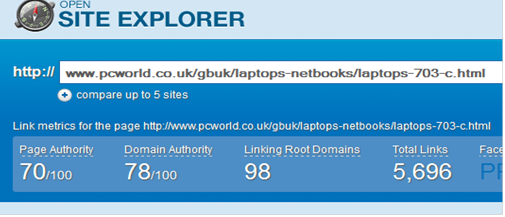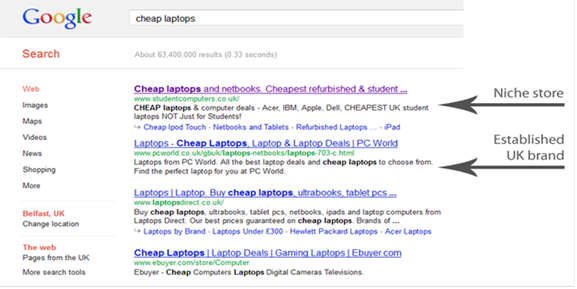To me it’s still amazing that a cms like WordPress can build you a professional looking site in a few minutes, my first site was built in Microsoft Frontpage and involved many long nights and a few tears! However just because it’s now easier to build a website doesn’t mean it’s easier to create one that is ultimately successful and makes money, because the success of a site is often down to the competition it faces from similar sites in the marketplace. The problem is that many webmasters assume that just because they have an attractive site with quality content that they will automatically rank at the top of Google for their chosen keywords. I’m not saying that good content won’t rise to the top but it can take quite a while to happen on its own and if your competition is established and also providing the information people are looking for where does that leave you?

Finding your topic
One of the biggest mistakes webmasters make is targeting a huge market that they have no chance competing in. For example my first blog was about laptops and I thought it would be nice if I could rank for the term “laptops” on Google! Needless to say there was no way that was ever going to happen, what I needed to do instead was find a niche keyword/section of the computer market that I could dominate. So I started to look into “gaming laptops” which I was always interested in and I used the Google keyword tool to source out several related keywords which I might be able to rank for. The key here is that because I was already within a sub-section of a larger market I was no longer competing with some of the larger PC manufacturers and stores, I had found my niche.
Keyword research
To say keyword research is not an exact science is quite an understatement, we don’t know every factor that Google uses to determine who ranks for what, neither can we say how much weight is given to the factors we do know about. However when you look at things broadly it’s possible to get an idea just how hard your competitors are working and this is all I’m looking for as my only goal is to out-work they guy at the top.
#Check 1 – Title tag
How many of the sites in the top 5 for the target keyword have the exact phrase in their title tag? I’m not saying that title tag is the most important factor in ranking (it definitely isn’t) but if your competitors have got this easy step wrong it’s a sure sign that you’re not dealing with SEO professionals.
#Check 2 – Unique links count
Since we know that incoming links are the main way search engines assign authority it’s important to get a idea of the total number of sites linking to our competitors. The mistake many webmasters make though is just looking at the total number of links instead of the number of unique domains. For instance if you get a site-wide link on one site with 2000 pages that’s 2000 links but that isn’t the same as a single link from 2000 different sites. A good place to get the unique count is opensiteexplorer which is free to use. I recommend adding in your top 5 competitors and looking at the average number. What I’m looking for here is a number I can beat, if they have 4,000 unique links that’s going to be though.

#Check 3 – types of link
In the above check we got a solid number for the unique sites linking to our competitor but this is only half the story because not all links are equal. What I want to do is get an overall picture of the links they are getting because it would be impossible to look at every one. Instead I’m looking for a footprint of low value links that I know I can beat e.g. is the majority of the profile made up from, no-follow blog comments, forum signatures or links in spam content? If so I know I can do much better and more than likely Google is itching for the chance to show a better site.
I also have a quick look at the anchor text of the incoming links, is it diverse or have they tried to build every anchor for their target keyword? If so they may not be around for long since Google is cracking down heavily on obvious attempts to manipulate the system like this. If they have hundreds of different anchors (you can get this from ONS too) it’s a sign of natural links or an SEO professional who knows what they are doing.
#Check 4 – Authority in the niche or single page
The bigger brands like amazon and ebay have really started to take over the results in recent years but that doesn’t mean they have the best content, it’s just that Google knows it can trust them not to be spam. But often these large brands will have only a single page on the topic and will provide very little information apart from some technical specs on the subject and it’s here where you have an opening. In my opinion it’s much easier to go up against a larger site with just a single page who isn’t really “working” the term than a real niche site which is constantly adding relevant content and getting links. So even if you see a recognised name ranking for a term you want you should still perform checks 1 -3 because often there are many areas you can beat them on like building an entire site with great content dedicated to the topic, with a few good links this site will beat the bigger brands (in my opinion) for most keywords.

Conclusion
Even after all of these checks are done the ultimate decision on whether to go for a particular niche/keyword or not will be down to you. After all we all have different skill levels and time we can put in when it comes to internet marketing. My main point if you’re a beginner would be to err on the side of caution if you’re not sure about difficulty, it’s much better to be the No3 guy in a small market that No345 in a major one. Web design and internet marketing is a learning process and it’s the little successes that will keep you motivated, I hope this post has helped in some way.
By Guest Author – The post is by Pablo at earningmoneyonline.co.uk who writes on the principles of making money from internet marketing and web-design.











